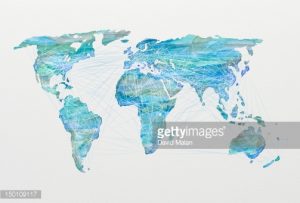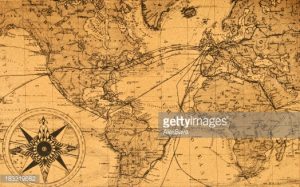My recent appointment as lecturer at the History Department of the Utrecht University has brought me in close contact with the bourgeoning field of International Relations (IR) studies. Inevitably, as I read articles and books on the subject, and design and teach related courses, I am comparing the theoretical and methodological assumptions of IR with the insights I receive from my parallel study of convict transportation in the context of the “Carceral Archipelago” project. This is a fruitful comparison, I think, because the two fields arguably share their main issues – global connections and exchanges – but seem to proceed largely in opposite directions and along distinct epistemological traditions. Indeed, I contend here that mainstream approaches within IR studies are alternative, rather than complementary, to the standard approaches in the historiography on convict transportation, and global history more generally. On this basis, I argue for the need to take side, and I position myself explicitly on the side of the global historical (and social historical) perspective.
In my opinion, the main differences between IR studies and the new historiography on convict transportation grapple around four key issues:
1. Unit of analysis
IR studies focus squarely on nation states, primarily defined by the “Westphalian model” as a political unit with sovereignty and territory (and therefore clear-cut borders). Some IR scholars have addressed the distinct ways in which the Westphalian model has been historically compromised by means of negotiations and coercion, and the impact of transnational organizations and companies; however the nation-state remains the point of departure of their analysis. Moreover, they see modern empires as an extension of (European) state sovereignty to other world-regions, rather than as a distinct and more fluid form of sovereignty (Benton 2010).
Conversely, the scholarship on convict transportation is based on a global historical understanding, highlighting the porosity of borders and the limits of sovereignty as the basis of global entanglements. Empires are typically its unit of analysis, with their polycentric structure and context-based practices. Connections among empires – through the metropole or through inter-colonial links – are also highlighted, for example in relation with extradition practices of convicts and POWs, trans-imperial exchanges of legal and punitive theories and practices, and the issue of escaped convicts crossing the borders of empires.
2. The West and modernity
Mainstream IR scholarship adopts an unashamedly Eurocentric perspective. The basic narrative tells about the expansion of Europe (and the West), its economic system and model of state, as the single most important factors behind the creation and expansion of international relations. It is a story of “the West” bringing “modernity” (in the singular) to “the Rest”. Inevitably, this has obscured the role of non-Western countries in the game of international relations. Therefore, critical interventions have been made in recent years to re-orient the approach. “Non-Western International Relations Theory” (Acharya and Buzan 2010) is slowly gaining visibility, as well as attempts at “Decentering international relations” (Nayak and Selbin 2010) and “Decolonizing international relations” (Jones 2006; Darby 2016). On the one hand, critical scholars seek to put more and more countries of the “Global South” on the map of IR; on the other hand, they explicitly question the “Western bias” in IR (Tickner and Wæver 2009) and try to “put the ‘international’ back into IR” (Tickner and Blaney 2012).
A recent article by Andrew Phillips (2016) has gone one step further, by arguing for the potential of the encounter of Global IR and Global History. On this basis, the author has foregrounded hybridization, rather than homogeneization, as the defining process in world politics; consequently, he has highlighted the existence of multiple and entangled modernities, or the polycentric character of modernity. Through its reference to the anti-Eurocentric stance of global history, Phillips’ theoretical frame resonates with the approach we take in the “Carceral Archipelago” project, for example when we look at the defining role of local and regional actors in the colonies in shaping the empire through convict transportation and convict labour. The historiography of convict transportation as a whole also reconnects with New Imperial Histories in making the point of the reciprocal entanglements between the “metropole” and the “colonies”, with the latter influencing for instance the perception of ethnicity and the conceptualizations of labour management in the metropole.
3. Agency
Phillips also foregrounds the need for a “pluralistic conception of historical agency”, thus focusing on both “European and non-European agency in shaping the imperial hierarchies that mediated inter-societal interactions during the age of empire” (p. 2). This point nicely matches the argument of the researchers on the Carceral Archipelago project on the need to address the multi-sitedness of agency, i.e. the fact that decisions on convict transportation highlight the role of multiple actors in different parts of the empire (and beyond) (Anderson et al. 2016). Both approaches contrast with the standard view in IR studies, which emphasizes “core” states and place major international conferences centre-stage, often without addressing the question of their actual impact “on the ground”.
The scholarship on convict transportation does not only differ with IR studies in relation to the question of multi-sited agency. It also addresses the agency of a much broader range of historical actors. By focusing on subaltern subjects like the convicts, and reconsidering their role as agents of empire, especially the “Carceral Archipelago” project stands in the tradition of social history. As such, it explicitly counters the standard top-down approach of IR studies, which almost without exception locates agency exclusively at the level of political and economic elites. Indeed, just like in the old-fashioned political history where kings and traders were the only historical actors, most IR scholars seem to have only diplomats, businessmen and policy-makers from the Western “centre” in their mind when they think about international relations. I contend that this is part of a broader political mind-set shared by many IR scholars: the idea that societal change stems primarily, if not exclusively, from within existing institutions, rather than from bottom-up social movements, or eventually through their conflicts and collaboration with the institutions.
These distinct understandings of agency also connect with different approaches to the question of power and its uneven distribution in human societies. IR scholars usually take this for granted, and build their theories from the perspective of institutional, and powerful, actors. Conversely, historians working on convict transportation are more likely to address the processes by which inequality among social groups and regions of the world has emerged and has been perpetuated historically. They do acknowledge the existence of such differences and their heavy consequences for the lives of individuals and groups. However, they do not view them as the exclusive product of the balance of power among states. Rather, they foreground the ways they emerge out of interactions among multiple actors across the local, national, regional and global levels. Moreover, they explore the forms of subalterns’ adaptation, resistance, organization, and anti-systemic action in relation to power inequalities.
4. Historicization
IR studies disproportionately address contemporary international relationships, and build large theories on case-studies over the last few decades. Additionally, when they do approach previous periods, the case-studies are most likely to be limited to the nineteenth and twentieth centuries, due to the standard but unverified assumption that the (European) long-nineteenth century represents a breakthrough in conceptions of the state, modernity and international relations. Consequently, and because their analytical focus lies on Europe, they see the Napoleonic bureaucratic state as the blueprint of the modern idea of the State globally. And just like some economic historians, even when they concede that several “waves of globalization” have existed in human history – the present one thus being only one of them – IR scholars usually see the period 1870s-1914 as the starting point of globalization. Therefore, they omit any reference not just to the early modern globalization that accompanied European expansion, but also to earlier “world-systems”, such as the one famously described by Janet Abu-Lughod (1991) for the late medieval period, and regional systems centred around Ancient Asian and American empires.
Most IR scholarship also features a “presentist” bias. History, when it is addressed at all, is a mere laboratory to test theoretical questions and issues that stem from present imperatives. Whereas one might certainly agree that, to a certain degree, “all history is contemporary history” (Croce) and that historical research ought to intervene in present debates, I contend that the presentism of most IR studies produces serious distortions in the selection and interpretation of historical processes. Indeed, within that field, past processes are not analysed in their own merit and the complexity of contexts is often reduced to over-simplified “case-studies” that support pre-defined theoretical conceptualizations. In this way, a “usable past” is produced that in most of the cases responds uncritically to the short-term interest of policy-makers, funding agencies and corporate partners, and to “trendy” topics in the contemporary public debate (e.g. on “terrorism”, “peace-keeping”, etc.).
Here too, the field of studies on convict transportation, and the “Carceral Archipelago” project therein, takes a distinct approach, and stands in a different scholarly tradition. As the Carceral Archipelago team has suggested in a collective article, a “usable past” can emerge “from addressing broad historical and contemporary questions and through appreciating differences in experience across contexts, time, and space” (Anderson et al. 2015, p. 161). In other words, history can tell something about the present primarily through methodological and theoretical awareness and by bringing the longue durée of social processes back in usually short-sighted political and social science-driven debates. In my view, this is a more subtle way to frame the relationship between the past and the present: it allows paying due attention to the specificity of historical contexts; it deals with differences among historical practices within and among distinct empires and regions; and it highlights persisting power inequalities among both polities and social groups while simultaneously acknowledging the individual and collective agencies of all historical actors, rather than only the elites’. More generally, this idea of a “usable past” counters the idea of a linear march of history towards (the Western model of) progress and modernity, and highlights instead the plural, connected, contingent and context-based character of the historical fabric. Indeed, it is precisely their skill in dealing with complexity, contradictions, inequalities and plurality what historians can offer to the often hyper-simplified and superficial contemporary debates.
IR studies and the historiography on convict transportation (and global history more broadly) are two bourgeoning fields in contemporary scholarship. An encounter among them is desirable, since they both address global connections and exchanges. At the same time, given the present major epistemological and methodological differences I have sought to foreground in this blog post, this encounter can only stem from an open confrontation, rather than by simply juxtaposing the two areas of scholarship. Indeed, I view most streams within IR studies as alternative, rather than complementary, to the standard approach in the historiography on convict transportation. In this blog I have looked at four issues around which these major differences emerge, besides pointing to some partial overlaps between convict transportation history and some critical perspectives on IR studies. Hopefully, this exercise will contribute to stimulate a debate among scholars in and across the two research area, in this blog or elsewhere.





 Subscribe to Christian De Vito's posts
Subscribe to Christian De Vito's posts
Recent Comments